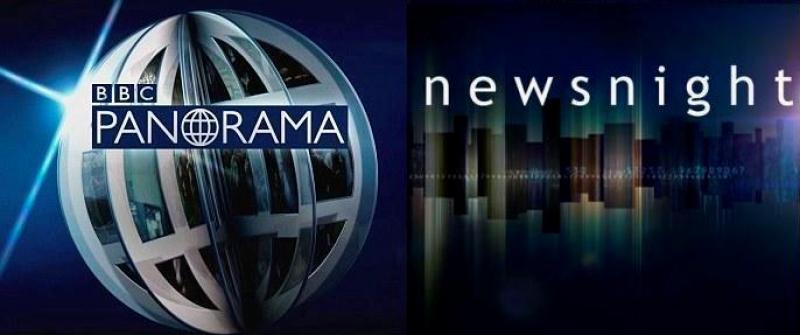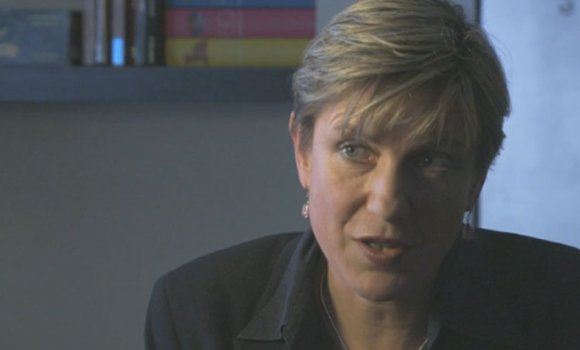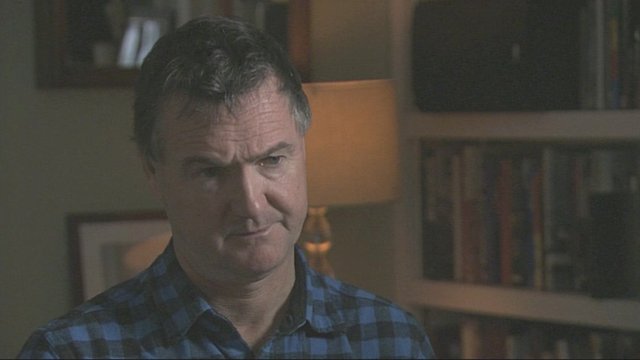Panorama: Jimmy Savile - What The BBC Knew, BBC One | reviews, news & interviews
Panorama: Jimmy Savile - What The BBC Knew, BBC One
Panorama: Jimmy Savile - What The BBC Knew, BBC One
Extraordinary television as the Corporation turns its guns on itself

From 10pm last night to around 11.40, the BBC did what no other broadcaster in the world would have the stomach for. It turned its guns with maximum lethalness on itself. The result was extraordinary television.
Newsnight had five minutes to add a final topsoil of spoilers to the stories that had been trailed all day: not only the clips of reporter Liz MacKean (pictured below right) and producer Meirion Jones expressing their dissatisfaction with the way their scoop had been pulled, but also the news that their editor Peter Rippon had stepped aside. The Newsnight story about Newsnight not running a story, the very shortest of short straws in the Newsnight office, was then handed over to a squeaky kid in jeans. “Take this bullet for the team,” it will have presumably been put to him. “No one else possesses a bargepole long enough.” But he was only on screen for 90 seconds before a nation of licence-fee payers switched to BBC One.
 Panorama did indeed address, with as much forensic precision as it could muster, Rippon’s decision not to broadcast the Jimmy Savile story. Was he leaned on from on high? Did he throw up a smokescreen by latterly arguing the story was not about exposing Savile but about exposing Surrey Police’s failure to expose Savile? All the facts will not emerge until the second of the BBC's two independent enquiries announced by DG George Entwistle. In the mean time, while it found no evidence of jiggery-pokery from upstairs, Panorama: Jimmy Savile – What the BBC Knew swung a mace in the edit suite.
Panorama did indeed address, with as much forensic precision as it could muster, Rippon’s decision not to broadcast the Jimmy Savile story. Was he leaned on from on high? Did he throw up a smokescreen by latterly arguing the story was not about exposing Savile but about exposing Surrey Police’s failure to expose Savile? All the facts will not emerge until the second of the BBC's two independent enquiries announced by DG George Entwistle. In the mean time, while it found no evidence of jiggery-pokery from upstairs, Panorama: Jimmy Savile – What the BBC Knew swung a mace in the edit suite.
Last night the BBC finally ran MacKean’s original Newsnight interview with Karin Ward, one of Savile’s victims from Duncroft Approved School, in which she described being persuaded to give the BBC DJ and presenter oral sex in exchange for an appearance on television. To anyone with half an ear, it was credible testimony. But Rippon did not watch the interview and chose to spike the story “for editorial reasons,” reported Panorama’s gumshoe Shelley Joffre. “Instead they broadcast this.” Cue Shane Richie introducing a Boxing Day tribute to Savile from a studio full of beaming children.
But the lion’s share of the programme investigated the bigger question for the BBC: the long history of Savile evading detection. The stories of his taste for molesting young girls were rife, the rumours legion. And while hindsight is a wonderful thing, the copious clips of Savile invading the personal space of children now look plain-as-a-pikestaff chilling. Panorama put the question to any number of those who had some inkling: reporters from Nationwide, the producer of Jim’ll Fix It, Paul Gambaccini at Radio One. None of them felt inclined or empowered to speak up. A troika of BBC higher-ups did confront him with the allegation in the early Seventies, but their star presenter bluntly denied it all and that was that.
 Indeed, the BBC might have carried on missing the story altogether had it not been for a bizarre coincidence. Savile died on a Saturday. On Monday morning Meirion Jones (pictured left) came into work at Newsnight and suggested the time was right to turn rumour into fact. He happened, because his aunt had been head at Duncroft when he was a boy, to have seen Savile in action. But for that, it’s entirely possible that Savile’s garish gravestone in Scarborough may still be standing.
Indeed, the BBC might have carried on missing the story altogether had it not been for a bizarre coincidence. Savile died on a Saturday. On Monday morning Meirion Jones (pictured left) came into work at Newsnight and suggested the time was right to turn rumour into fact. He happened, because his aunt had been head at Duncroft when he was a boy, to have seen Savile in action. But for that, it’s entirely possible that Savile’s garish gravestone in Scarborough may still be standing.
The interview with Karin Ward made for doubly traumatic viewing: largely of course for what it contained, but also because it came out only as part of an exposé of the BBC’s failings. Panorama had scoops of its own. Among them, the most devastating is the suggestion that Top of the Pops may in the 1970s have allowed a paedophile ring of BBC employees led by Savile to scour the dancefloor for victims. There was also a clip of Savile draping a Jim’ll Fix It badge with a long ribbon around a pack of boy scouts. The smallest at the front with a toothy grin can’t have been more than 10. Nearly 40 years later a large hulk of a silhouette sat on a bed with his back to camera and explained how Savile had taken him to his dressing room and persuaded the boy to rub him through his trousers.
Is it the lowest point for the BBC in 50 years, as argued by John Simpson? There is clearly savage anger that “the scoop of the year”, as Panorama called it, migrated across to ITV, and bitter internal feuding: “Panorama will give the police any evidence it uncovers,” concluded Joffre headgirlishly, having extracted from Newsnight their explanations for not doing the same. But the Hutton enquiry and the drumming-out of its Director General Greg Dyke surely breasts the tape. And if Gove gets his way and the whole enterprise is privatised, Simpson may wish to reconsider. Panorama was a triumphant example of BBC journalism at its very best. But the BBC News department’s Christmas party will be attended by wisps of tumbleweed.
Add comment
The future of Arts Journalism
You can stop theartsdesk.com closing!
We urgently need financing to survive. Our fundraising drive has thus far raised £49,000 but we need to reach £100,000 or we will be forced to close. Please contribute here: https://gofund.me/c3f6033d
And if you can forward this information to anyone who might assist, we’d be grateful.

Subscribe to theartsdesk.com
Thank you for continuing to read our work on theartsdesk.com. For unlimited access to every article in its entirety, including our archive of more than 15,000 pieces, we're asking for £5 per month or £40 per year. We feel it's a very good deal, and hope you do too.
To take a subscription now simply click here.
And if you're looking for that extra gift for a friend or family member, why not treat them to a theartsdesk.com gift subscription?
more TV
 Mr Scorsese, Apple TV review - perfectly pitched documentary series with fascinating insights
Rebecca Miller musters a stellar roster of articulate talking heads for this thorough portrait
Mr Scorsese, Apple TV review - perfectly pitched documentary series with fascinating insights
Rebecca Miller musters a stellar roster of articulate talking heads for this thorough portrait
 Down Cemetery Road, Apple TV review - wit, grit and a twisty plot, plus Emma Thompson on top form
Mick Herron's female private investigator gets a stellar adaptation
Down Cemetery Road, Apple TV review - wit, grit and a twisty plot, plus Emma Thompson on top form
Mick Herron's female private investigator gets a stellar adaptation
 theartsdesk Q&A: director Stefano Sollima on the relevance of true crime story 'The Monster of Florence'
The director of hit TV series 'Gomorrah' examines another dark dimension of Italian culture
theartsdesk Q&A: director Stefano Sollima on the relevance of true crime story 'The Monster of Florence'
The director of hit TV series 'Gomorrah' examines another dark dimension of Italian culture
 The Monster of Florence, Netflix review - dramatisation of notorious Italian serial killer mystery
Director Stefano Sollima's four-parter makes gruelling viewing
The Monster of Florence, Netflix review - dramatisation of notorious Italian serial killer mystery
Director Stefano Sollima's four-parter makes gruelling viewing
 The Diplomat, Season 3, Netflix review - Ambassador Kate Wyler becomes America's Second Lady
Soapy transatlantic political drama keeps the Special Relationship alive
The Diplomat, Season 3, Netflix review - Ambassador Kate Wyler becomes America's Second Lady
Soapy transatlantic political drama keeps the Special Relationship alive
 The Perfect Neighbor, Netflix review - Florida found-footage documentary is a harrowing watch
Sundance winner chronicles a death that should have been prevented
The Perfect Neighbor, Netflix review - Florida found-footage documentary is a harrowing watch
Sundance winner chronicles a death that should have been prevented
 Murder Before Evensong, Acorn TV review - death comes to the picturesque village of Champton
The Rev Richard Coles's sleuthing cleric hits the screen
Murder Before Evensong, Acorn TV review - death comes to the picturesque village of Champton
The Rev Richard Coles's sleuthing cleric hits the screen
 Black Rabbit, Netflix review - grime and punishment in New York City
Jude Law and Jason Bateman tread the thin line between love and hate
Black Rabbit, Netflix review - grime and punishment in New York City
Jude Law and Jason Bateman tread the thin line between love and hate
 The Hack, ITV review - plodding anatomy of twin UK scandals
Jack Thorne's skill can't disguise the bagginess of his double-headed material
The Hack, ITV review - plodding anatomy of twin UK scandals
Jack Thorne's skill can't disguise the bagginess of his double-headed material
 Slow Horses, Series 5, Apple TV+ review - terror, trauma and impeccable comic timing
Jackson Lamb's band of MI5 misfits continues to fascinate and amuse
Slow Horses, Series 5, Apple TV+ review - terror, trauma and impeccable comic timing
Jackson Lamb's band of MI5 misfits continues to fascinate and amuse
 Coldwater, ITV1 review - horror and black comedy in the Highlands
Superb cast lights up David Ireland's cunning thriller
Coldwater, ITV1 review - horror and black comedy in the Highlands
Superb cast lights up David Ireland's cunning thriller
 Blu-ray: The Sweeney - Series One
Influential and entertaining 1970s police drama, handsomely restored
Blu-ray: The Sweeney - Series One
Influential and entertaining 1970s police drama, handsomely restored

Comments
The best bit of writing I've